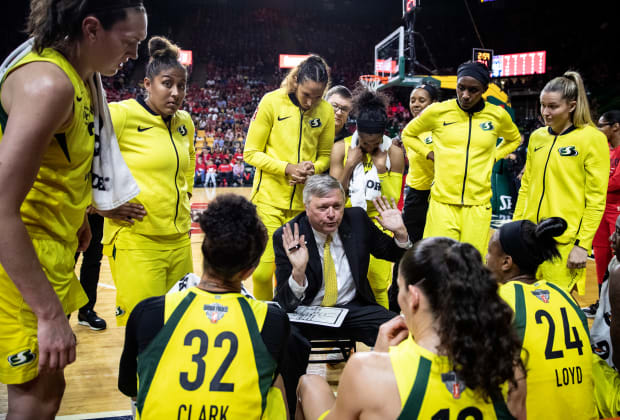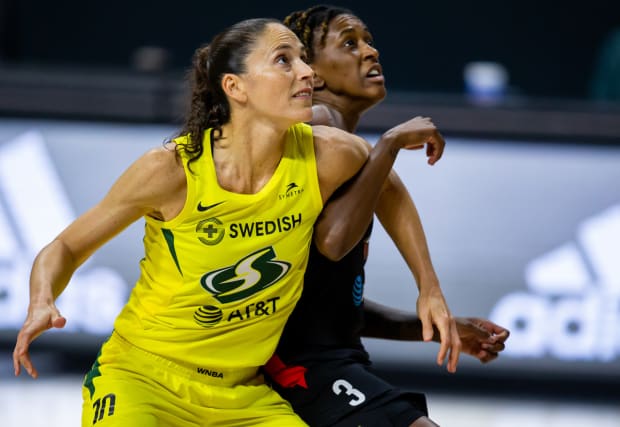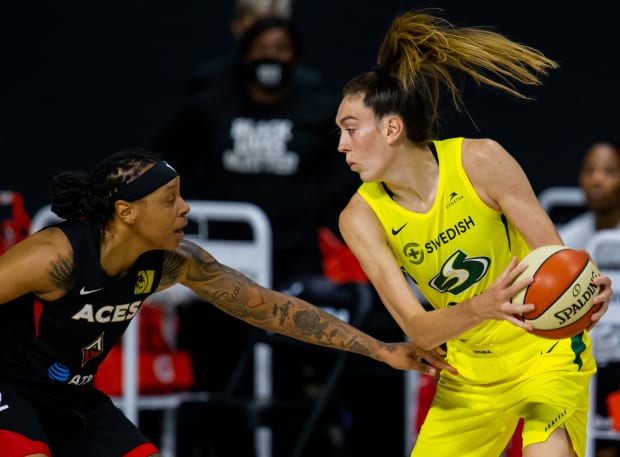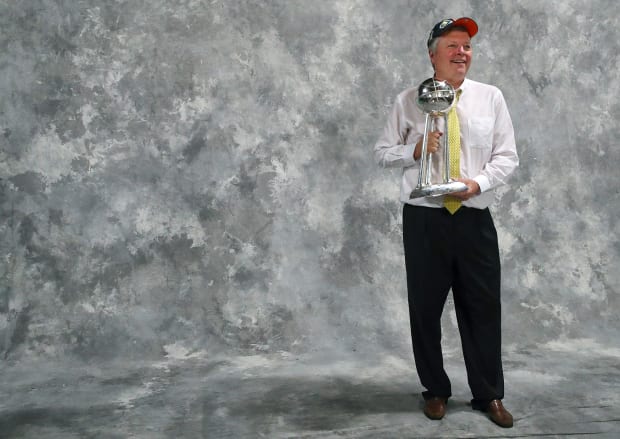Health kept Dan Hughes out of the bubble. Now, if the Seattle Storm coach wins it all in Florida, he'll do it remotely, from his favorite chair. In Ohio.
As the Seattle Storm’s players saunter onto the floor in Bradenton, Fla., for Game 2 of the WNBA Finals on Sunday afternoon, their coach fidgets nervously on the oversized “lucky” chair in his Buckeye State living room. He is roughly 1,000 miles away.
Far from his team, Dan Hughes is surrounded by screens: his phone, iPad and television, plus two additional monitors that allow him to see every replay at least three times, plus his computer, on which he’s watching the game with me over Zoom. He slugs from water bottles as if he’s just emerged from a month in the desert, such are his nerves. A morning walk failed to calm him.
Nothing, though, can change the baseline, that the 65-year-old coach wants to but can’t be there, at the IMG Academy, in the prime seat on the Storm’s bench. Not the best health news, his full recovery last year from a bout with cancer. Not his team’s 1-0 series lead heading into Sunday, over the Las Vegas Aces. Not the best perk of coaching from home, the absence (largely) of media obligations. Not even his new and constant proximity to the bathroom, which has never been more important, with all that nervously gulped water. Some folks, he says, have gone so far as to ask whether he planned to even watch these Finals. Come on! “They have no idea the connection I have to these players. They’re all I think about.”

Under normal circumstances, Hughes would be there on the bench, drawing up plays, imploring his charges and shouting at refs, tossing in a Good call! every once in a while, he says with a laugh. But this is 2020, a year absent normal circumstances. And Hughes, who led the Storm to the franchise’s third title just two seasons ago, was all set to travel to the WNBA’s bubble … only to be told that he had not and would not be medically cleared. His age, combined with his cancer history, he says, made him too high of a risk.
“Well, it took a pandemic, but we finally found a way to keep Dan home,” he remembers one team official joking. Still, he hates when strangers (or writers) say erroneously that he opted out of this season. He would have done anything to opt in.
“I’ve coached in a lot of different situations in 42 years,” Hughes says, specifically citing the season that surgery to repair a torn Achilles prevented him from rising off his courtside seat.
“But this,” he continues, “is almost futuristic.”
Over Zoom, he shows off his new gameday “office”: the 75-inch flatscreen ... the signed and framed Steph Curry and Tim Duncan jerseys ... the beloved photo of his last championship team, in 2018 ... and an entire wall devoted to the Beatles, including a WNBA ball signed by Paul McCartney.
Hughes tries to explain what it’s like to coach from afar. He imagines he’s going through something like what the Warriors’ Steve Kerr endured when he missed 43 games on the bench in 2017 due to complications from back surgery and a spinal fluid leak.
The key, Hughes says, is to stay connected, which has never been more difficult in sports than during the ongoing pandemic. So he’ll send videos, as he did before Game 1, personalized for every player and coach. He saved star forward Breanna Stewart for last, emphasizing her return from a brutal 2019 Achilles injury, back to her MVP form. With Stewart and point guard Sue Bird out last season, Hughes coaxed the rest of his players to grow in their absence. This is not a lost season, he told them.
Before this season tipped, the Storm welcomed back all five starters, plus the injured ones, and with some health luck Seattle surged to an 18-4 record, plus the second seed in these strange bubble playoffs.
As tip-off approaches, Hughes plays one of his favorite songs, the one he’d listen to every game day before heading onto the court. His gaze hardens as the lyrics to Run for the Roses—he prefers a cover of the Dan Fogelberg song, by Richie Furay—gain momentum and, for him, deeper meaning:
And it's run for the roses
As fast as you can
You fate is delivered
Your moment's at hand
It's the chance of a lifetime
In a lifetime of chance
The ball tips, and Hughes is just as nervous in his offseason home office as he was the first time he ever coached. After two decades teaching high school and college players, he jumped to the WNBA in 1999, first as an assistant with the Charlotte Sting, then taking over the Cleveland Rockers. (Both teams have since been dissolved.) After a long stint with the San Antonio Stars (now relocated and renamed the Aces), he landed with the Storm in 2017. And beside him from the start in Seattle was Gary Kloppenburg, an assistant he trusted implicitly—a notion, mind you, that neither expected to be as important as it has been.
Hughes watches Game 2 not at all like a casual fan, but more like, well, a coach. He cares about ball rotations and floor spacing and defensive switches. He’s wearing his lucky yellow Jimmy Hendrix T-shirt and a black Storm jacket, sitting in the same chair where he watched every other game in the league this season, next to his wife, Mary.
Hughes wants his players to keep pushing the ball, finding easy baskets in transition while making life difficult for Aces star A’Ja Wilson inside. Since Las Vegas is the more physical team, he wants the Storm to spread the floor and limit fouls. Some of those things happen early, as Seattle opens up a 31-22 lead near the end of the first quarter, with a shooting percentage hovering around 70. But some of those things do not happen, as Wilson catches open passes inside and continues to collect easy baskets.

Sometimes Hughes screams at the refs. Other times he shouts instructions at players who can’t hear him. And others he’s calm and collected (while downing waters as if he’s running a marathon). He’s still coaching, even if he’s more like an advanced scout. And there are perks to being home, like his ability to rewind on any one of his screens and see replays in real-time, instead of hours after a game ends. But the overall feeling of it all—the swirl of nerves and anticipation, and the deep, deep, deep desire for his players to perform well—never leaves him. It never will. Once a coach, always a coach. “Good Lord!” he shouts when Bird gets whistled for a questionable foul. “Are you kidding me?”
Kloppenburg has filled in admirably, just as he did when doctors removed a cancerous tumor in Hughes’s digestive track back in the spring of 2019 and the coach took time off to recover. As much as Hughes knows his players can hack it without him, he knows, too, that his assistants can lead on their own. He’s especially proud of Noelle Quinn, who retired as a player in ’18 and segued right onto the bench, where she’s developed into what Hughes describes as a “brilliant offensive mind.” On Sunday, Bird wiggles through a screen and knocks down a triple, and here Hughes sees Quinn’s offensive imprint combined with Kloppenburg’s deft roster management. This pleases him; it’s what he intended all along, to empower those he worked with.
In the second quarter the Storm extends a lead behind Stewart, who Hughes says could make any coach look smart. “She’s the most talented player I’ve ever been around. Sometimes she’s the most amazing player in the world.”
At halftime, with his team up 48-42, Hughes makes a trip to the bathroom, a superstition at every game, in person or remote. He sends Quinn a list of maybe 10 adjustments to add—or not—to whatever instructions Kloppenburg gives during the break, including: Keep running, creating space. … Bird is seeing the floor well; give her more pick-and-rolls. ... Great job not fouling ... Force Wilson out from the paint. Hughes has done this for every game, he says. He also roped in a 25-year-old analytics enthusiast (and Miami Heat scout) named Henry Yeh, whose takeaways he combines with his own to craft detailed morning-after reports for the Storm’s assistants.

In the end, it doesn’t help—doesn’t change anything, really—that doctors recently reaffirmed Hughes as being clear of his cancer. Or that the development he led in 2019 really did make this year’s team better. Or that he prepared more for ’20 than he had any previous season. Or that Kloppenberg helped prove this team’s depth extends even to coaching. None of that matters to Hughes as much as the thing that has always mattered most to him: that he take a team and make it better, help it win. This could be in Ohio or on Mars, in health or in sickness, against the backdrop of a global pandemic or in world peace. Coaching is coaching, always will be.
He can understand, then, why the NFL coach in Washington, Ron Rivera, fought to stay on the field during his team’s loss on Sunday, even when he needed assistance at times to move. Hughes understands the pull, the want to disregard COVID-19 restrictions, or even one’s own health, the empty feeling for any coach who can’t help the people who mean the most to them.
Las Vegas begins the third quarter like a desperate team that knows it can’t afford to fall two games down in a best-of-five series. Hughes expected this. He drafted several of the Aces’ best players when the team was in San Antonio; he knows how good they are and expects them to fight. But his Storm pulls back in front on the strength of the pieces he put together, because of what he taught them, because of how he helped develop them.
There was center Natasha Howard—whose father Hughes had coached years ago—spinning inside the paint, scooping in buckets for 21 points. There was Jordin Canada—a backup guard who Hughes first spotted when she was 15, through a family friend; who he’d drafted in the first round in 2018; and who’d thrived last year in Bird’s absence—adding 10 points off the bench. There was Alysha Clark—who Hughes had drafted and then cut in San Antonio, before reuniting with her in Seattle; who had transformed from an undersized post player into a stealth wing and perhaps the league’s best defender—locking down the Aces’ stars. And there was Stewart being Stewie ... Bird being Bird … and Quinn’s offensive influence … and Kloppenburg’s steady hand.
This team is everything Hughes designed it to be: deep and versatile, built to win by three-point barrages or by playing stout defense or even by mixing it up with a more physical opponent. As Seattle’s advantage balloons, Hughes begins to look ahead. His four grandchildren will visit this evening, and he will feed them pizza and forget about basketball and steady his nerves before putting them down and then returning to the tape. He will speak with Yeh and later send their combined takeaways to assistants by 8 a.m. on Monday morning. He will count his blessings for having Stewart, a player so talented that he says she makes him want to coach for as long his health and the Storm will allow. He plans to be back next season, but he wonders what the pandemic will have to say about that.
Hughes cracks open another water bottle as the final seconds tick away. He believes he’s there in Florida—if not in physical body, then in emotional spirit. “Take Stewie out,” he mutters, now and forever a basketball coach.
Soon his phone begins to ping with congratulatory texts, and his eyes well with tears as he reads one aloud: I sure wish you could be there for this. You are such a big part of this. He knows he’s making an impact, even from afar, and he knows this distance is what’s best for him. But of course he wants to be there, in person, in the bubble, with his team.
“Coaches know how hard this is,” he says. “But [texts like that] help.” His voice drops to a whisper. “They help.”
